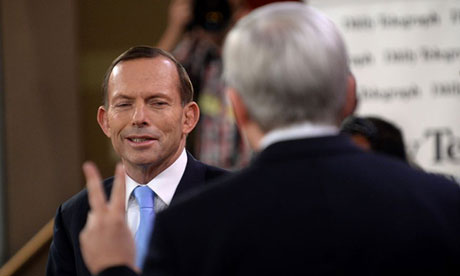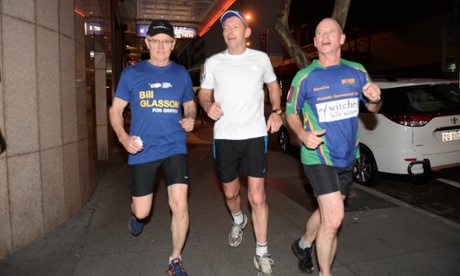Lenore Taylor, political editor
theguardian.com, Wednesday 28 August 2013
Undecided voters in western Sydney force Coalition leader and Kevin Rudd to defend their economic credentials
Tony Abbott listens to Kevin Rudd in the third debate in Sydney on Wednesday. Photograph: Alan Porritt/AFP/Pool/Getty Images
Tony Abbott has promised to delay a surplus rather than break his election promises even if he inherits a worse-than-expected budget, as undecided voters in western Sydney forced the leaders to defend their economic credentials in the third televised leaders' debate.
The Coalition had laid the groundwork for the debate by releasing $31.6bn in savings earlier Wednesday, which meant Abbott was better able to answer Kevin Rudd's allegation that he was hiding budget "cuts" but allowed the prime minister to highlight the Coalition's intention to abandon tax breaks for small businesses.
"One of the reasons I am making fairly modest additional commitments in this campaign, why I have been quite upfront about $31bn in reasonable savings, is because I don't want to find after the election that we can't keep commitments," Abbott said.
And when pushed to answer whether he would delay a surplus or keep his promises he said, "Yes, we'll keep them all," in an answer that completes the Coalition's transition from the immediate "budget emergency" it declared from opposition to the more cautious approach to budgeting it intends to take if, as all major polls are suggesting, it wins government on 7 September.
Pressed on the budget deficit and the national debt, Rudd repeatedly reminded the audience of the global financial crisis, saying "the reason we borrowed temporarily during the GFC was because the alternative was to see the economy going into recession … to see small businesses collapse and unemployment levels rise." And he attacked Abbott for not matching Labor's six-year promises for school funding.
Abbott was again forced to defend his paid parental leave scheme, which Labor strategists insist is an electoral liability for the Coalition.
Challenged over his paid parental leave plan by a forklift driver from Mount Druitt, who asked why he should be "be paying his taxes so the pretty little lady lawyer on the north shore can have a kid", Abbott said the premise of the question wasn't true because the "lion's share" of the scheme was funded by the 1.5% levy on big business.
But Rudd's central attack line about Abbott's "unfunded promises" and "hidden cuts" was somewhat undermined when he was challenged by a questioner over his own "thought bubbles" and uncosted policies on moving the navy north, lowering the company tax rate in the Northern Territory and building a high-speed train.
"If you are going to make commitments that are right out for the long term it is much better if you have a record of delivering on your promises," Abbott said, saying he intended to "underpromise and overdeliver rather than make promises on the never never".
Although Abbott is under internal pressure from the National party and some rural Liberals to take a more populist position on foreign ownership and competition policy, it was Rudd who appeared to indicate a change to Labor's long-held policies in both areas.
On foreign acquisition of agricultural land Rudd said he was "a bit anxious about simply an open slather approach" and would prefer to see foreign investment as part of a joint venture with Australian companies.
"I am looking very carefully about how this affects the overall balance of land acquisition in Australia … I think when it comes to rural land, land more generally, then perhaps we need to adopt a more cautious approach," he said.
And on competition policy, Rudd said he was concerned about the impact of the supermarket duopoly of Coles and Woolworths on small farmers.
"Farmers say they are getting squeezed and squeezed by Coles and Woolies," he said, promising to "have to look at how we provide better guarantees for proper competitive conduct so the man and woman on the farm are not carrying the can".
Abbott held the line on Coalition policy, saying that if the foreign purchase of land was judged to be in the national interest then he was in favour of it, and pointing out he was proposing tougher anti-dumping rules.
Neither leader snapped at the other in the manner of Abbott's "does this guy ever shut up" line from the second debate, although when Abbott said during one answer that he would try not to waffle, Rudd replied that the answer had in fact been "waffle cubed". And before the debate Abbott's wife, Margie, and Rudd's wife, Therese, and daughter, Jessica, had what appeared to be a friendly conversation.
The questions from the audience of 100 undecided voters at the Rooty Hill RSL were primarily focused on services and the economy, raising issues neither leader has talked much about, including dental care and aged care.
Asked about environmental policy, Abbott said the answer was a strong economy.
"If we have a stronger economy we are more likely to be able to have the environmental safeguards we want … poor countries tend to have worse environmental outcomes than rich ones," he said.
Abbott also promised he would not close any of Labor's Medicare Local centres, a shift from the policy restated by his health spokesman Peter Dutton on Tuesday when he said that said that they would be "reviewed" and those that did not deliver frontline services could be closed.
Tony Abbott 'would delay surplus before breaking election vows' | World news | theguardian.com





 Bill Glasson (left) on a morning run with Tony Abbott and Queensland premier Campbell Newman. Photograph: Alan Porritt/AAP
Bill Glasson (left) on a morning run with Tony Abbott and Queensland premier Campbell Newman. Photograph: Alan Porritt/AAP












